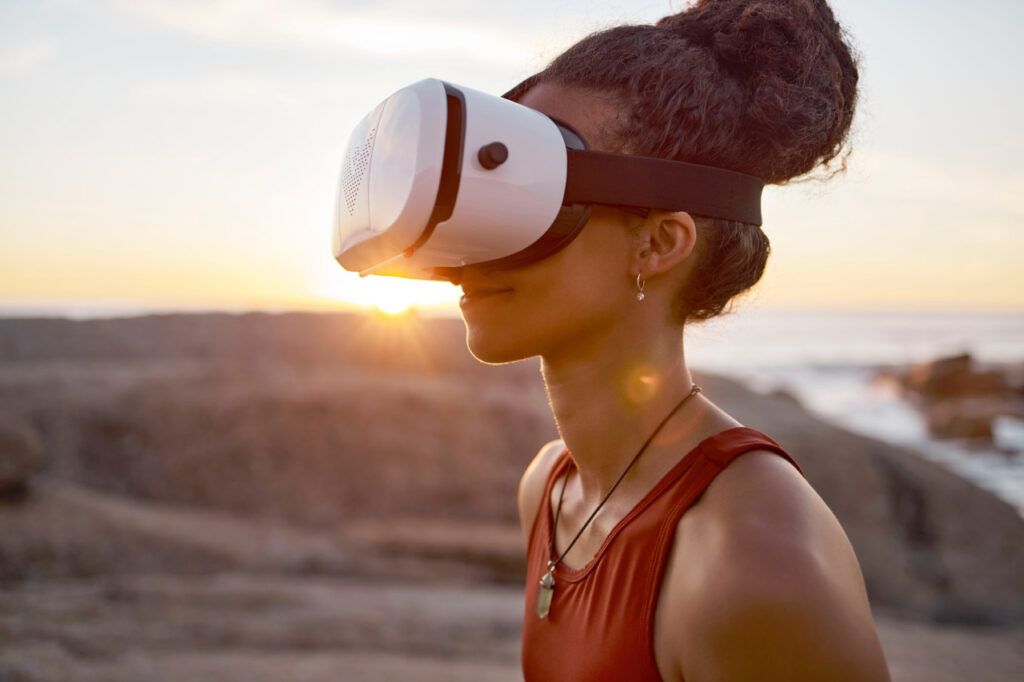The Metaverse will revolutionize the way we travel. It will offer the ability to create an entirely new travel experience by offering destinations that are both new, yet familiar. And this is not just due to the Metaverse’s ability of recreating even the most impressive travel destinations as a virtual space.
Metaverse Experiences will make choosing a vacation destination easier
Deciding is hard – and often makes choosing your next travel destination feel like work. This is where Metaverse replicas of popular locales could be immensely useful.
Someone considering a trip to Paris could visit a virtual replica of the city’s most popular attractions, including the Eiffel Tower and the Louvre for a taste of what to expect. Someone with a trip to Japan on their bucket list could see virtual cherry blossoms blooming around Mount Fuji in the Metaverse and cross an authentic replica of Tokyo’s famous Shibuya intersection. If the Metaverse user liked what they saw, they could book their trip directly from the Metaverse.
Famous events in vacation destinations, such as Carnival in Rio, could also be recreated in the metaverse. A metaverse experience designed with great attention to detail is likely to sell more trips than even the best two-dimensional promotional material.
Metaverse tourist attraction design will evolve into an art form
However, there is a challenge for designers of Metaverse travel experiences: Their 3D virtual worlds must inspire maximum wanderlust. They must be representative of each destination without giving too much away. This is a balancing act that travel companies will perfect over time.
The Metaverse can help explore the history of travel destinations
Many historic buildings have been damaged over time or have disappeared altogether. In the metaverse, they can be rebuilt as virtual versions.
Experiencing a reconstruction of the Egyptian pyramids or the Buddhas of Bamiyan in the Metaverse could increase the desire to travel there in real life. In addition, the historical knowledge that Metaverse users can gain in this way could enhance the trip as a whole.
In-depth research into the history of a destination can be time-consuming, which is why many travelers neglect it. In the Metaverse, research can be brought to life through immersive environments.
The Metaverse can streamline the way we choose accommodation
Choosing the best hotel can also be a hassle. One of the biggest issues is that hotel websites often provide misleading images and videos. In the future, it may become the standard for hotels to provide a metaverse version of their property and its surroundings, making careful research much easier.
Will All-inclusive Metaverse be the vacation of the future?
Even vacations that take place entirely in the metaverse are possible. With the rising cost of living worldwide, traditional vacations are out of reach for many. A Metaverse vacation – complete with a Metaverse travel guide and exciting activities over several days or even weeks – could be an exciting alternative.
The more creative and diverse such virtual worlds are, the closer we get to establishing them as a legitimate alternative to traditional vacations. In particular, the addition of gamification elements can deliver interactive experiences in the metaverse that are more fun and exciting than anything found in the real world.
Metaverse worlds could be generated from videos and photos in seconds thanks to AI
As technology advances, creating interactive 3D rooms and landscapes in the metaverse will no longer be the time-consuming process that it is today. Even with current technology, it is already possible to create realistic 3D landscape models from videos and photos of travel destinations.
Source: YouTube.com / bycloud
Using a technique called photogrammetry, an AI automatically marks key points on individual images of a landscape and maps them into three-dimensional space, creating beautiful 3D environments. As photogrammetry matures, it may be able to simplify the creation of 3D landscapes to the point where programming and 3D modeling skills are no longer required. The result will be nothing short of a revolution in the process of crafting metaverse worlds.






